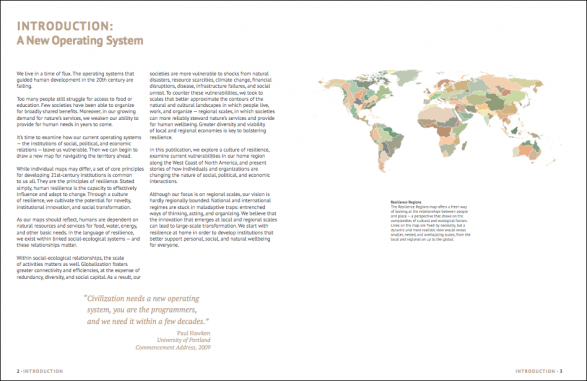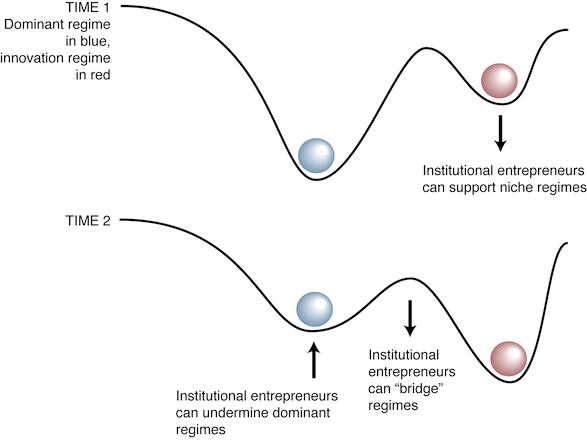Four years ago, on May 3rd 2009, Paul Hawken came to Portland, Oregon, to deliver a “direct, naked, taut, honest, passionate, lean, shivering, startling, and graceful” commencement address at the University of Portland (pdf).
“Civilization needs a new operating system,” he said, “you are the programmers, and we need it within a few decades.”
Hawken’s metaphor of transformation — along with its ascription of agency, charge of responsibility, and invitation to opportunity — fit perfectly the tone I sought for the Ecotrust publication “Resilience & Transformation: A Regional Approach,” and we used it as a pull-quote with the introduction (pdf or magazine).

As the metaphor implies, current operating systems — the institutions of social, political, and economic relations — leave the peoples of the world vulnerable to deep-rooted social and ecological stresses. There can be no resilience without transformation.
I sometimes think of the resilience-transformation relationship as binary, like man-woman or black-white: the existence of each dependent on the other. No resilience without transformation.
And I sometimes picture resilience and transformation interacting across time, in an unfolding resilience-cum-transformation narrative. System resilience following system transformation.
For programmers or designers, these interactions are visualized in a figure redrawn below, from a paper by Frances Westley and 12 coauthors (“Tipping toward sustainability: emerging pathways of transformation”).

In this figure the programmers or designers are labeled institutional entrepreneurs, and the new operating system is described as an innovation regime. But the patterns of change are similar.
Consider our usual practices as part of a regime: our gardening, eating, and such as part of a food regime; our needs for mechanized mobility as part of a transportation regime; and so on. These regimes are defined by the worldviews, the rules and norms, the business models, the infrastructures and technologies that support ways of existing and interacting — while shaping and being shaped by ecological interdependencies.
In this view, a new operating system is more like a network of operating systems (i.e., regimes), each fulfilling a particular need and each, potentially, operating closer to home. The basic three-step of resilience-for-transformation design becomes: nurture regimes that better support wellbeing, undermine maladaptive regimes, and help to bridge one regime to the next.
Does this conceptual framework fit or inform your own practices?


Trying to reinvent a new “operating system” or “regime” or economic structure as it is in order to stave off environmental, economic, socio-cultural disaster is like trying to reinvent our own biological human body digestive systems so that we can enjoy bread that contains gluten and not suffer from indigestion, gaseous distention and other health problems. Instead of reinventing the digestive system, we have to reinvent our diet, eg no gluten, ie no wheat. We cannot change our system of economy (taxed capitalism regulated by representational democracy) because there really is no alternative (other than state owned communism regulated by totalitarian fascist oligarchy) so we must change what we put into it. Unfortunately, we are about to starve our current economy when it runs out of its primary food, oil. And since we cannot manufacture oil, our current economy, which was raised on oil from its birth, will die, but not first before it has a terrible temper tantrum and destroys much of what it has built, as it goes through the 5 stages of grief (anger being the destructive one.) In the end, a new economy will be born and it will learn to eat traditional fuels, wood for example, and wonder at the history of the economy that preceded it, much as we wonder about ancient Rome or ancient Egypt. The arrogance of the author is common amongst those who delude themselves into thinking that intelligence will get us out of this one. Nor can we change our system of intelligence – it’s the one we’re born with, same as our digestive system. Cheers
Hi Dave, thanks for your thoughts.
One set of forces you’re highlighting would, in systems terms, be called “resistance to change” or “path dependence.” True, i didn’t talk about those, and they are formidable.
Still, “arrogance”? Nowhere on this site (or in the “Resilience & Transformation” publication) did i claim that “intelligence will get us out of this one.” I merely wrote that resilience & transformation are endlessly emergent, and that humans can be agents in their unfolding.
Certainly, operating systems (or regimes) are not invented out of whole cloth, thus the emphasis on “niche” in the figure. A niche is an outside-the-norm instance of social or social-ecological relations that you or i see as worth supporting, and you or i do indeed support. Thanks for what you do!
Btw, i recently wrote on “intelligence” in a post called “To be is to feel”:
https://www.solvingforpattern.org/2013/05/06/to-be-is-to-feel/
Cheers, Howard